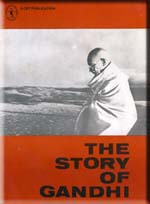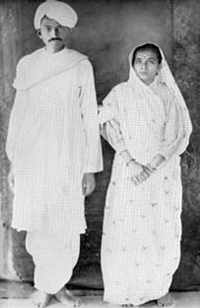
P.O. SEVAGRAM, DIST.WARDHA 442102, MS, INDIA. Phone: 91-7152-284753
FOUNDED BY MAHATMA GANDHI IN 1936
The Story of Gandhi

THE STORY OF GANDHI
Written by : Rajkumari Shanker
Table of Contents
- Birth And Childhood
- Preparation for England
- In England
- Back In India
- In South Africa
- In India
- Back In South Africa
- Indian National Congress
- In South Africa Again
- Assault
- Tolstoy Farm
- Returned To India
- Establishment of Satyagraha Ashram
- Benaras Speech
- Champaran Satyagraha
- Ahmedabad Mill-Workers Satyagraha
- Rowlatt Act
- Jallianwalla Bagh Massacre
- In Prison
- Salt Satyagraha
- Sevagram
- Cabinet Mission Plan
- Quit India
- He Ram!!!
About This Book
Written by : Rajkumari Shanker
First Edition :1969
I.S.B.N :81-7011-064-5
Published by :Children's Book Trust,
Nehru House, 4
Bahadur Shah Zafar Marg,
New Delhi 110 002,
India.
© CBT, 1969
Download
Chapter-13: Establishment of Satyagraha Ashram
Gandhi was back in India after twelve long years.
A great reception awaited him in Bombay. Gandhi was overwhelmed by the great love shown to him by the people. Gokhale was in Poona and was in poor health, so Gandhi went to see him. He was received with great affection. Gandhi told Gokhale that his plan was to have an ashrama where he could settle down with his Phoenix family. They had already reached India and were at Santiniketan.
Gokhale approved of the idea and promised whatever help he could give.
Gandhi went to Rajkot and Porbandar to meet his relatives and then went on to Santiniketan. The teachers and students gave him a loving welcome. There Gandhi met Tagore for the first time and also C.f. Andrews who was there too.
During his short stay at Santiniketan Gandhi heard the sad news that Gokhale had passed away. He immediately left for Poona, C.F. Andrews accompanying him as far as Burdwan.
‘Do you think,’ Andrews asked Gandhi, ‘that a time will come for satyagraha in India? If so, how soon will it be?’
‘It is difficult to say,’ replied Gandhi. ‘For one year I am to do nothing. Gokhale made me promise that I would travel in India for one year to gain experience, and that I would express no opinion until I had finished this period of probation. So I do not think there will be any occasion for satyagraha for five years.
After attending the shraddha ceremonies of Gokhale, Gandhi met the leaders of the Servants of India society. Out of respect for Gokhale he would have joined the Society, but there was opposition from a certain section of the members.
Gandhi visited Rangoon for a short period and on his return he went to Hardwar during the time of the Kumbha Fair. About seventeen hundred thousand people attended the Fair. Volunteer corps from difficult organizations had gone to Hardwar to be of service to the big crowds that were flowing in. Gandhi was invited to go there with the Phoenix party to help the volunteers. The Phoenix group went there and Gandhi joined them. Gandhi was pained at the many happenings and shortcomings at the great religious fair. There was corruption. There was cheating, and many other unsocial activities. Scant care was taken about sanitary arrangements.
All this made Gandhi feel very sad. He thought a great deal about the problem of how to improve the Indian character.
In May 1915 an ashram was established in a village near Ahmedabad. Ahmedabad was an ancient centre of handloom weaving and Gandhi thought the place was suited for the revival of the cottage industry of hand-spinning.
‘Our creed is devotion to truth, and our business is the search for and insistence on truth,’ he said.
A simple uniform style of clothing was worn by all who were there. They took their food together in a common kitchen and strove to live as one family.
Gandhi told the members: ‘If you want to serve the people it is essential to observe the vows of truth, ahimsa, celibacy, non-stealing, non-possession, and control of the palate.’
One day Gandhi said to the members of the ashram, ‘I have received an application from an untouchable family who want to join us here. I am replying that they are welcome.’
This created quite a flutter. To live with untouchables! Even Kasturbai had he misgivings. Gandhi’s mind was made up, however, and there could be no objection from the members of the ashram. But the patrons of the ashrams did not like the idea they stopped their monetary help.
The ashram was faced with a financial crisis, but help came unexpectedly. A rich man came to the ashram and gave Gandhi Rs. 13,000. Gandhi was surprised at this great gesture.

Figure 1: With Kasturbai at a reception in Ahmedabad
Figure 2: With Tagore and C. F. Andrews
Figure 3: With Kasturbai, 1915